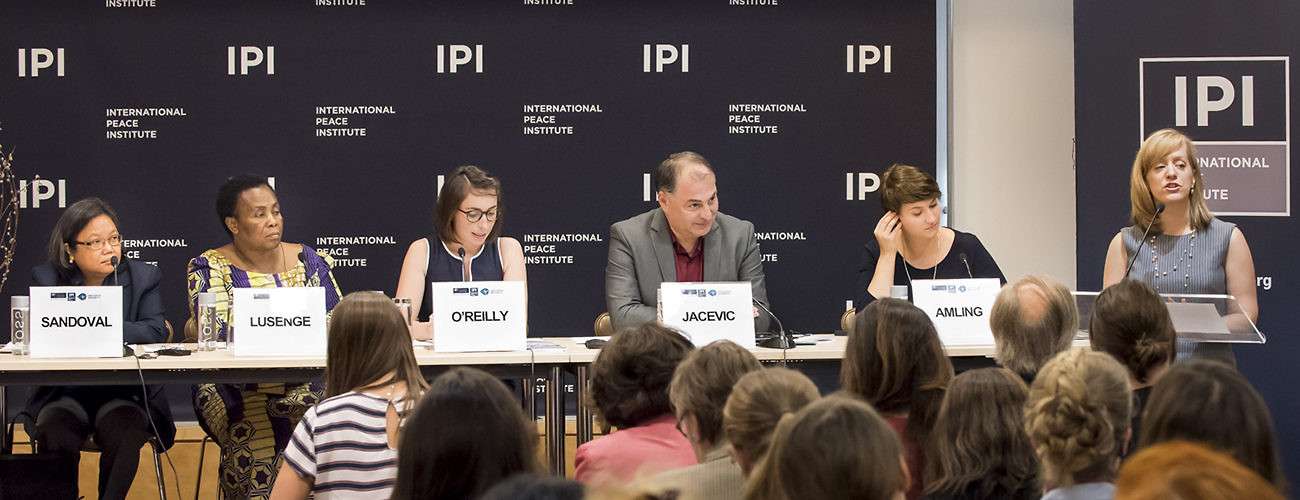A year after the High-Level Review of the implementation of the landmark Security Council Resolution 1325 on Women, Peace and Security, an IPI meeting took up the subject of National Action Plans (NAPs) and how they help turn policy into reality.
Andrea Ó Súilleabháin, IPI Senior Policy Analyst, spoke to the dichotomy between policy as it is written, and what women experience in the field. “The divide between the normative agenda adopted in the Security Council and the realities for women in peace and conflict around the world can sometimes seem extremely wide,” she said. She suggested NAPs as “one way to address this gap between internationally set policies and national and local realities.”
The number of countries creating national strategies to advance women’s participation in peace and security processes has more than tripled since 2010, from 18 to 63. NAPs for implementing Security Council Resolution 1325 on women, peace, and security were conceived to address the gap between prescriptive international frameworks and domestic realities. Nationally designed and owned, they reflect each country’s particular security needs and priorities for peace.
Marie O’Reilly, Director of Research, Inclusive Security, considered how NAPs developed in practice, and what impact they have. “Across the NAPs, what we find is that when women come together with men to discuss these peace and security issues, what we’re really talking about is human security,” she said.
Alexandra Amling, Researcher on Women, Peace, and Security, One Earth Future (OEF) Research, listed some of the challenges she has witnessed during the implementation phase of NAPs, stemming from a lack of political will or a lack of funding. “We have participatory approaches in fighting HIV/AIDS, poverty reduction, where we have inclusive processes, but in the more nationally sensitive field of peace and security, women’s voices have only recently been heard,” she said.
The funding challenge is more nuanced than just ensuring there is a budget in place. To implement NAPs, it is crucial to ensure that parallel planning for emergencies also happens, so that NAPs funds are not diverted when unexpected challenges arise, she said. “In Sierra Leone, we found what impact something like Ebola has on implementation,” she said. “Ebola killed implementation because it was a total lockdown. As we talked to people in Serbia, they said, ‘We also have a flood’ so resources were also redirected.”
Maria Cleofe Gettie Sandoval, former Undersecretary, Office of the Presidential Adviser on the Peace Process, Philippines, said that her country benefitted from a national law which ensured that, prior to drafting the NAP, the government and civil society in the Philippines “already had a relationship of coordination, consultation, working together.” This relationship actually meant that in the case of the Philippines NAP, “it was civil society that initiated the conversation and invited government in, rather than the other way around,” she said.
Julienne Lusenge, Director, Fund for Congolese Women, said that NAPs can have a very real impact in women’s lives. “Everybody talks about the sexual violence in the Democratic Republic of the Congo, but without looking at women in a holistic approach,” she said. “So, for us, the NAP is a tool to assess, measure, and have concrete actions with which we can move forward in terms of our fight against violence against women.”
Miki Jacevic, Vice Chair, Inclusive Security, emphasized it is crucial for NAPs to be localized and noted that implementing Guatemala’s NAP began with a law enforcement initiative. Community policing was reformed such that “local people view police as not something they would run away from as a force of oppression, but rather, as a source providing security at the local level.” Mr. Jacevic saw the impact of these changes first-hand, when his mother-in-law, who lives in Guatemala, said she was “now able to walk in the dark because the local police force now does include enough women so that she has that perception of safety.”
Mr. Jacevic, who is Bosnian, called for an end to the “notion that we are importing peace. “These women on the ground are the best peacemakers, we have to recognize and continue to build their capacity and partnership with government” he said. “These agents are going to make my Bosnia safer for me and my children. This is not a women’s issue. This is a peace and security issue that these NAPs help facilitate and make right.”
Marie O’Reilly moderated the conversation.
The event was co-organized with OEF and Inclusive Security.








